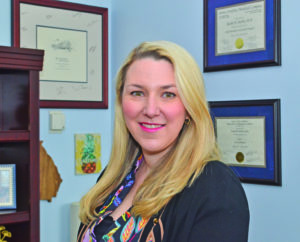
LEXINGTON How many surgeons can say their career began with a dare? Rachel Mathis, MD, FACS, can. While dissecting a fetal pig in 7th grade science, a classmate challenged Mathis to cut the pig’s brain out intact “without squishing it.” She did, and her success did not go unnoticed.
Mathis explains, “I couldn’t really turn down a dare and enjoyed it so much that my science teacher said, ‘You know, you might think about becoming a surgeon.’”
A graduate of Yale University with a BA in history of science and history of medicine, Mathis earned her medical degree from the Medical College of Georgia and then completed surgery residency training at Inova Fairfax Medical Center in northern Virginia, followed by a bariatric surgery fellowship at the prestigious Lahey Clinic in Boston.
Though Mathis knew she wanted to pursue surgery, it wasn’t until a rotation in her third year of residency that she knew bariatrics was the specialty for her. Mathis states, “I think it’s very unique in surgical specialties, because you get the long-term follow-up with patients that you don’t generally get with very many other surgical specialties. And, you can see the impact surgery makes on their life.”
Benefits of Bariatric Surgery
In 2020, after two years within CHI Saint Joseph Health as a general surgeon, Mathis joined the Center for Weight Loss Surgery (CWLS) where she works alongside fellow surgeon Alberto Zarak, MD, FACS, to provide a tool for patients, many of whom have been wrongly told that their only options are exercise and diet and that obesity is a personal failing and weakness on their part.
Mathis states, “Bariatric surgery provides a very effective tool in the toolbox of treating these patients — for helping patients limit their portion sizes, helping control their sensation of fullness after surgery, and helping induce hormonal effects on their insulin resistance. Just the dramatic weight loss that they can have with surgery — the extra weight that’s off their body — allows them to exercise more easily, have less joint pain and have less shortness of breath. So, it helps them get to the point where they can maintain their desired weight based on lifestyle.”
“Bariatric surgery provides a very effective tool in the toolbox of treating these [morbidly obese] patients.”— Rachel Mathis, MD, FACS
Though the benefits of these procedures are extensive and undisputable, as a nationwide average, only about 1% of patients who could qualify based on their BMI and their medical problems actually opt for weight loss surgery. Those who opt for surgery typically have only one regret. “The most common thing I hear from my patients that have bariatric surgery is that they wish they’d done it sooner. That it is lifechanging — not only in their size and their weight, but in the fact that they’re no longer on diabetes medications, blood pressure medications, and may not have to wear their CPAP for sleep apnea anymore. It can be completely life-changing for them.”
As an interesting side note, recent studies have shown that patients who’ve undergone weight loss surgery have fared much better after contracting COVID-19 than their morbidly obese counterparts.
For Mathis, the gold standard of bariatric surgery is still the gastric bypass. However, over the last few years, the gastric sleeve has gained popularity, especially with patients. For comorbidity resolution and weight loss, the bypass and the sleeve are, in general, equivalent to one another, so both surgical options are offered to patients unless there’s a compelling medical reason that one would be safer and more effective than the other. One mitigating circumstance is severe acid reflux, which can be exacerbated by the gastric sleeve and even result in esophagitis. If at all possible, both surgeries are performed either laparoscopically or robotically.
A Lifetime Commitment
At the CHI Saint Joseph Health – Center for Weight Loss Surgery, the commitment to each patient lasts throughout their lifetime. “We tell all of our patients that we are their team for life, whether they had their bypass yesterday or 10 or 20 years ago. It’s very important for them to follow up on a yearly basis, to have vitamin levels checked and to ensure that they’re doing well after their procedures,” says Mathis.
This CWLS team consists of Mathis and Zarak along with Bariatric Program Director Karen Hillenmeyer, BS, PA-C, who boasts decades of bariatric experience, two certified bariatric nurses, a dietician, an exercise physiologist and a psychologist — all working together to ensure the patient has the best chance for long-term success.
Each patient begins by attending a comprehensive bariatric seminar, which are currently being conducted virtually due to COVID, then an initial telemedicine consultation. During their first in-office visit, they meet with either a doctor or the program director for a full history and physical exam. An assessment by the rest of the team follows. Once they are deemed suitable for surgery, the real journey begins. Post-surgery, patients have additional coaching and regular follow-ups to assess progress and determine problems. Follow-up visits not requiring lab work can be hosted via telehealth.
Major Misconceptions
Knowing how controversial bariatric surgery can be, Mathis seeks to clear up two common misconceptions held by patients and physicians alike: Bariatric surgery should not be thought of as either a magic bullet or as a last resort.
Mathis says, “I think, for the general public and potential bariatric patients, there’s a common misconception that surgery is a magic fix and is taking the easy way out. Bariatric surgery is certainly not easy. We think of it as a three-pronged approach; your surgery is your tool to help you maintain appropriate portion sizes and make appropriate food choices, but your diet and your exercise are the other corners of that triangle. So, it’s not a magic bullet. It’s not a magic fix. It requires a lifestyle change.”
Mathis also urges doctors to look at bariatric surgery as an option for qualifying patients sooner rather than later: “We’re continuing to reach out and try to let both patients and physicians know this is an excellent option. And this isn’t a last resort option for patients that are morbidly obese.”


